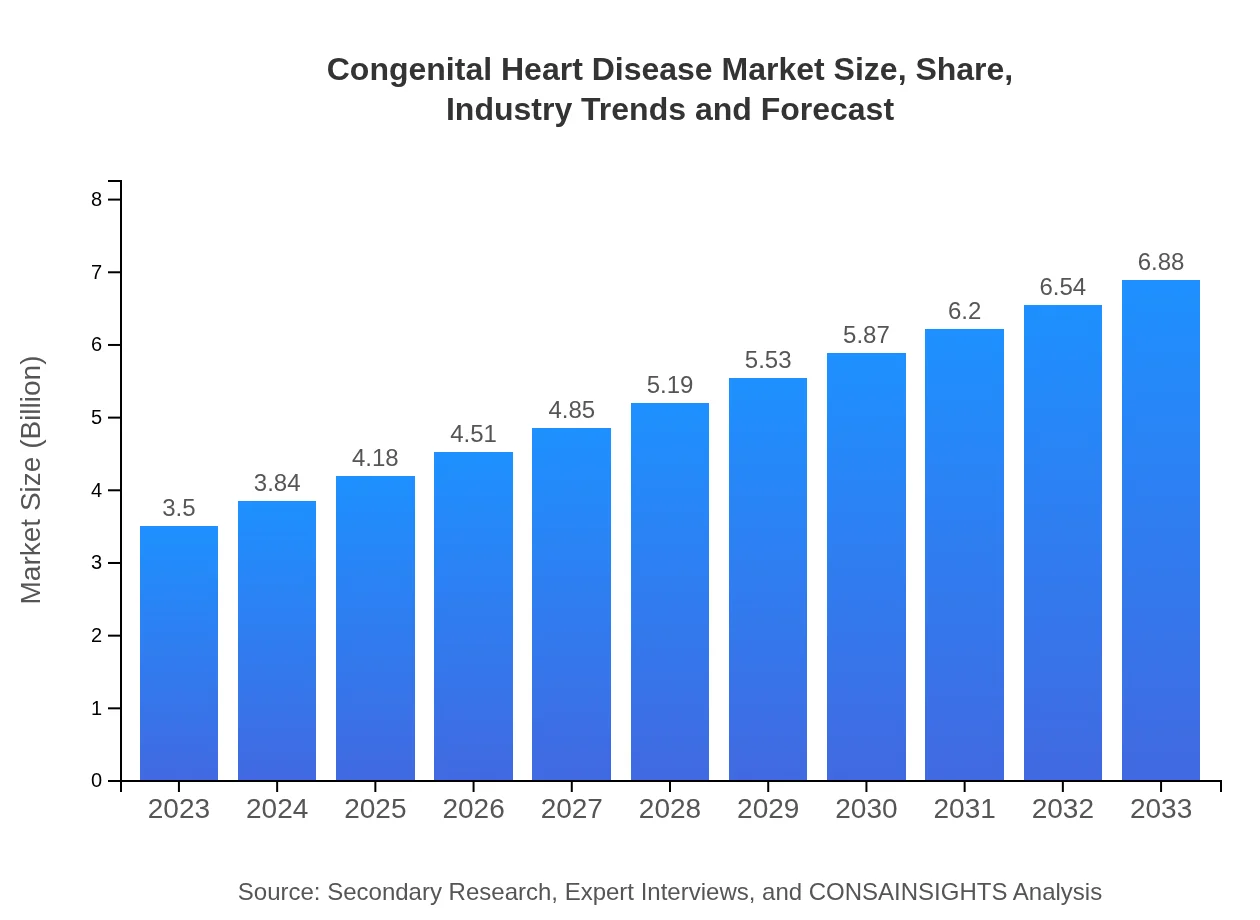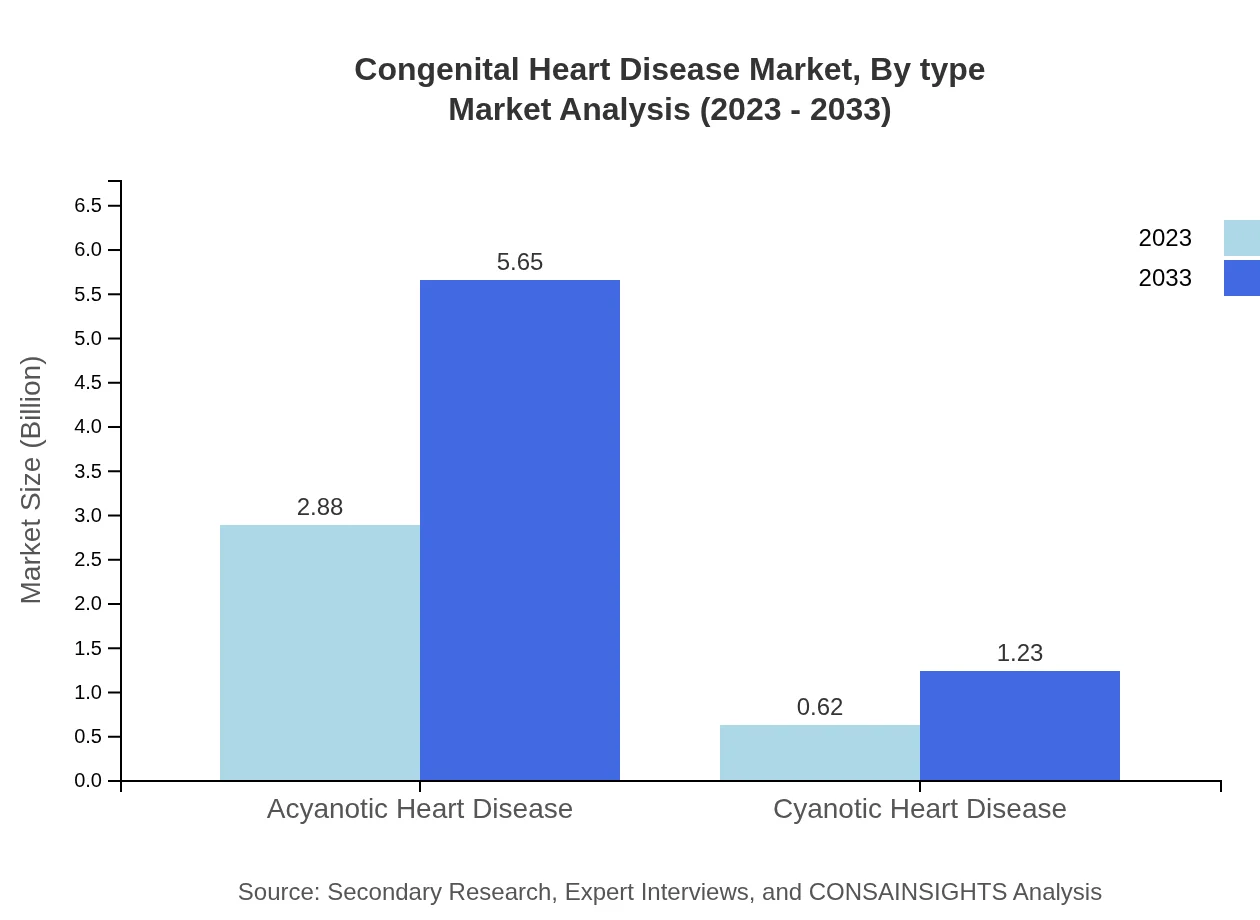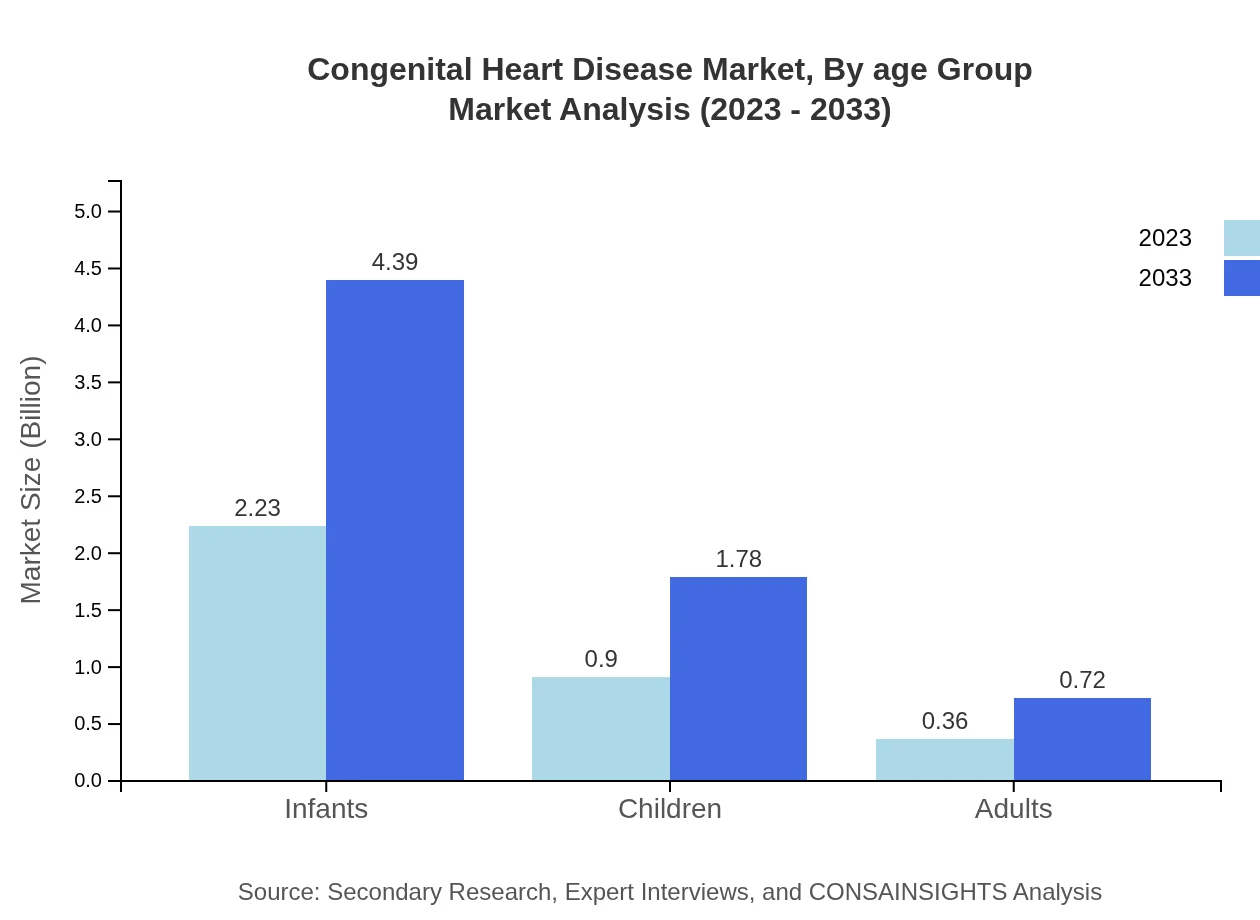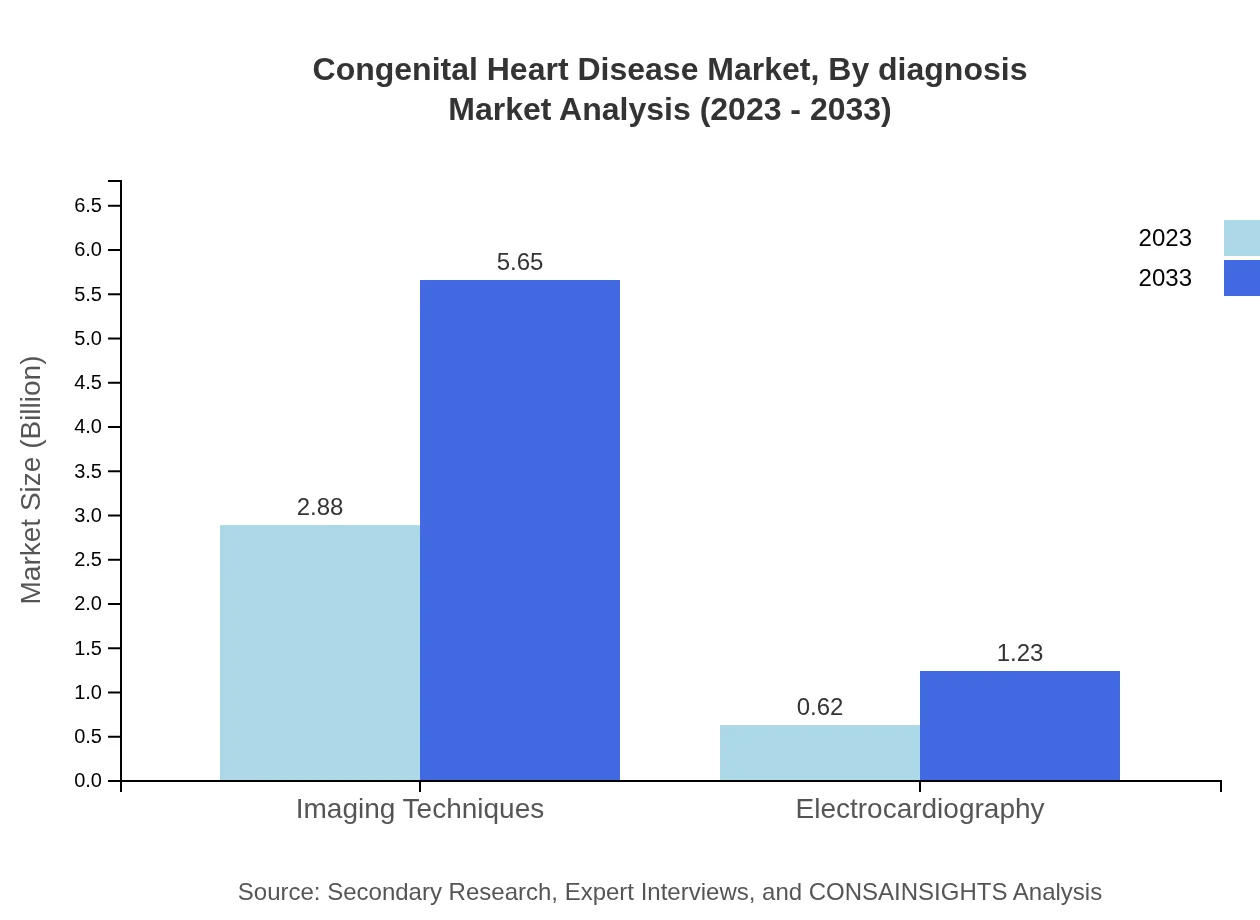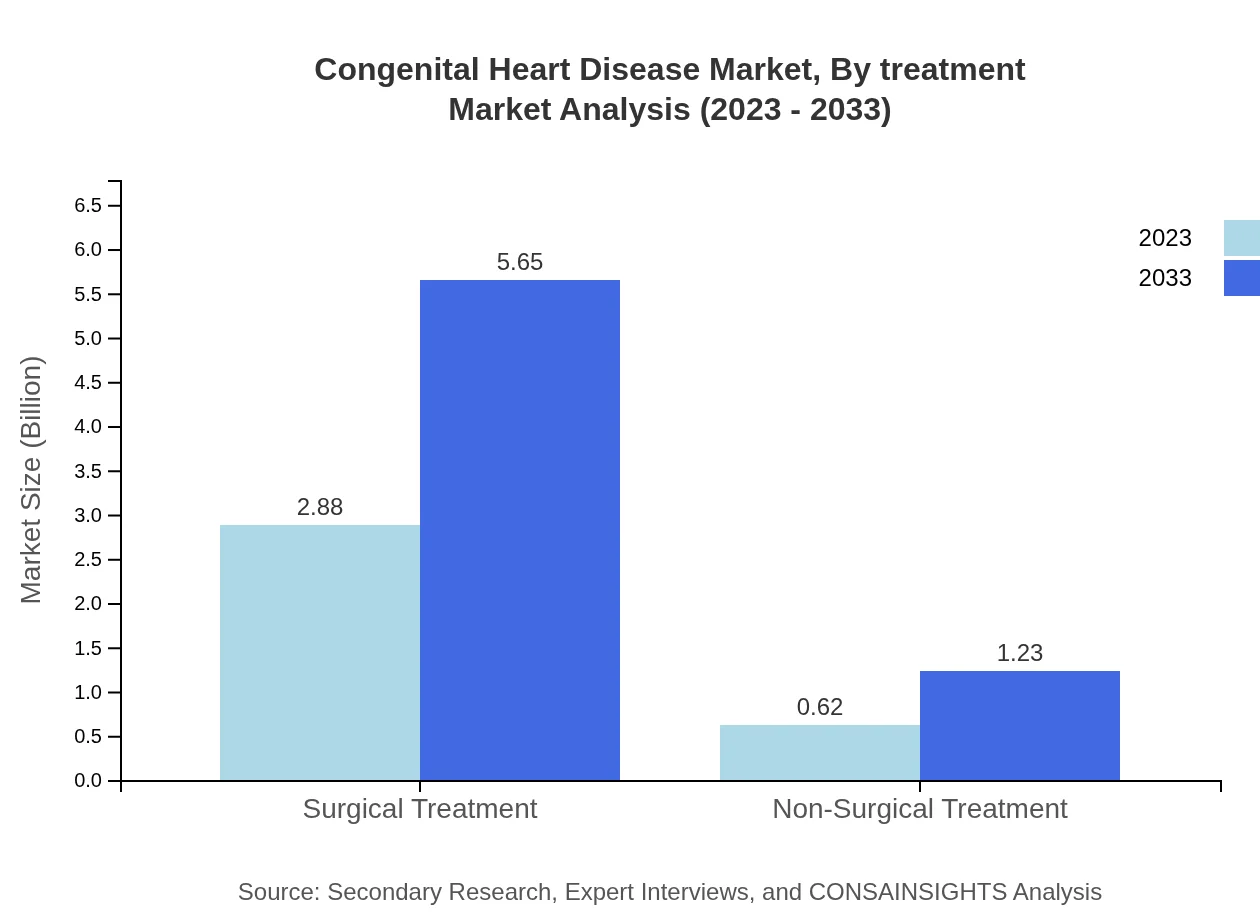Congenital Heart Disease Market Report
Published Date: 31 January 2026 | Report Code: congenital-heart-disease
Congenital Heart Disease Market Size, Share, Industry Trends and Forecast to 2033
This report provides a comprehensive analysis of the Congenital Heart Disease market, covering current trends, industry growth, and future projections from 2023 to 2033. Insights include market size, segmentation, regional analysis, technology impacts, and key players in the industry.
| Metric | Value |
|---|---|
| Study Period | 2023 - 2033 |
| 2023 Market Size | $3.50 Billion |
| CAGR (2023-2033) | 6.8% |
| 2033 Market Size | $6.88 Billion |
| Top Companies | Medtronic , Abbott Laboratories, Boston Scientific, Edwards Lifesciences, Gore Medical |
| Last Modified Date | 31 January 2026 |
Congenital Heart Disease Market Overview
Customize Congenital Heart Disease Market Report market research report
- ✔ Get in-depth analysis of Congenital Heart Disease market size, growth, and forecasts.
- ✔ Understand Congenital Heart Disease's regional dynamics and industry-specific trends.
- ✔ Identify potential applications, end-user demand, and growth segments in Congenital Heart Disease
What is the Market Size & CAGR of Congenital Heart Disease market in 2023?
Congenital Heart Disease Industry Analysis
Congenital Heart Disease Market Segmentation and Scope
Tell us your focus area and get a customized research report.
Congenital Heart Disease Market Analysis Report by Region
Europe Congenital Heart Disease Market Report:
The European Congenital Heart Disease market is estimated to be valued at $1.13 billion in 2023 and is projected to reach $2.22 billion by 2033. Europe benefits from strong healthcare networks and technological advancements. Key factors driving growth include increasing awareness, preventive healthcare measures, and collaborative initiatives for research and treatment development in cardiovascular health.Asia Pacific Congenital Heart Disease Market Report:
The Asia Pacific region presents a significant growth opportunity for the Congenital Heart Disease market, with a market size of approximately $0.61 billion in 2023, projected to grow to $1.21 billion by 2033. Factors contributing to this growth include rising healthcare expenditure, increased government initiatives promoting health awareness, and advancements in medical technologies. The rising prevalence of congenital heart defects, along with improved access to pediatric and adult healthcare services, is driving the market.North America Congenital Heart Disease Market Report:
North America stands as a leading region for the Congenital Heart Disease market, with a current market value of $1.24 billion in 2023, projected to grow to $2.43 billion by 2033. The region's growth is driven by advanced healthcare systems, high availability of specialized care, and significant investments in research. The prevalence of cardiac surgeries and innovations in treatment options are expected to sustain the market growth.South America Congenital Heart Disease Market Report:
In South America, the market for Congenital Heart Disease is estimated at $0.25 billion in 2023 and is expected to reach $0.50 billion by 2033. The growth is attributed to increased healthcare investments and improved diagnostic facilities. Governments in various South American nations are also enhancing investments in healthcare infrastructure, thereby improving treatment access for CHD patients.Middle East & Africa Congenital Heart Disease Market Report:
For the Middle East and Africa, the Congenital Heart Disease market is estimated to be $0.27 billion in 2023, expected to expand to $0.53 billion by 2033. While experiencing slower growth than other regions, increasing investments in healthcare infrastructure, rising healthcare demands, and a growing focus on maternal and child health initiatives are promising drivers for the region's CHD market.Tell us your focus area and get a customized research report.
Congenital Heart Disease Market Analysis By Type
The Congenital Heart Disease market can be divided into Acyanotic and Cyanotic Heart Disease segments. Acyanotic Heart Disease dominates the market with a size of $2.88 billion in 2023 and expected growth to $5.65 billion by 2033. It accounts for 82.19% of the overall market share. Conversely, Cyanotic Heart Disease, holding a market size of $0.62 billion in 2023, is projected to grow to $1.23 billion by 2033, contributing to 17.81% of the market.
Congenital Heart Disease Market Analysis By Age Group
The market segmentation by age group indicates that infants comprise the largest segment, valued at $2.23 billion in 2023 and projected to reach $4.39 billion by 2033, representing a market share of 63.78%. Children hold a market size of $0.90 billion with expectations rising to $1.78 billion by 2033, accounting for 25.82%. Adults constitute the smallest age group segment, starting at $0.36 billion and reaching $0.72 billion by 2033, with a share of 10.4%.
Congenital Heart Disease Market Analysis By Diagnosis
When examining diagnosis segments, Imaging Techniques dominate with a segment size of $2.88 billion in 2023, anticipated to rise to $5.65 billion by 2033 and retaining 82.19% of the market share. Electrocardiography also plays a crucial role, starting at $0.62 billion and expected to grow to $1.23 billion, accounting for 17.81%.
Congenital Heart Disease Market Analysis By Treatment
The treatment market for Congenital Heart Disease is divided into Surgical and Non-Surgical Treatments. Surgical Treatment holds a significant market size of $2.88 billion, growing to $5.65 billion by 2033, comprising 82.19% of the market share. In contrast, Non-Surgical Treatment, which is at $0.62 billion now, is expected to rise to $1.23 billion, representing 17.81%.
Congenital Heart Disease Market Trends and Future Forecast
Tell us your focus area and get a customized research report.
Global Market Leaders and Top Companies in Congenital Heart Disease Industry
Medtronic :
Leading global medical technology company that provides innovative therapies for congenital heart conditions through advanced medical devices and monitoring solutions.Abbott Laboratories:
Biopharmaceutical company renowned for its advanced diagnostics and therapeutic products for congenital heart diseases, focusing on enhancing treatment effectiveness.Boston Scientific:
Global company focused on bringing innovative medical solutions to patients with congenital heart diseases, especially in catheter-based therapies.Edwards Lifesciences:
Company specializing in heart valves and hemodynamic monitoring, providing essential solutions for patients suffering from congenital heart conditions.Gore Medical:
Known for its innovative medical devices and biomaterials, Gore Medical develops products that improve treatment options for congenital heart diseases.We're grateful to work with incredible clients.









FAQs
What is the market size of congenital Heart Disease?
The congenital heart disease market is valued at approximately $3.5 billion in 2023 and is projected to reach a market size of $6.86 billion by 2033, reflecting a compound annual growth rate (CAGR) of 6.8% over the forecast period.
What are the key market players or companies in this congenital Heart Disease industry?
Key players in the congenital heart disease market include well-known medical devices manufacturers, pharmaceuticals, and research institutions involved in innovative treatments and surgical techniques aimed at managing heart diseases in patients, particularly infants and children.
What are the primary factors driving the growth in the congenital Heart Disease industry?
The growth in the congenital heart disease market is driven by factors such as an increase in awareness of congenital conditions, advancements in surgical technologies, a rise in healthcare funding, and demographic shifts leading to a higher prevalence of heart diseases among infants and children.
Which region is the fastest Growing in the congenital Heart Disease?
The North American region is the fastest-growing market for congenital heart disease, with a market size projected to grow from $1.24 billion in 2023 to $2.43 billion by 2033. Following closely are regions like Europe, projected to grow significantly during the same period.
Does ConsaInsights provide customized market report data for the congenital Heart Disease industry?
Yes, ConsaInsights offers customized market report data for the congenital heart disease industry, catering to the specific needs of stakeholders including industry leaders, investors, and healthcare professionals, providing tailored insights and forecasts.
What deliverables can I expect from this congenital Heart Disease market research project?
Expect comprehensive deliverables from the congenital heart disease market research project, including detailed market analysis, segmentation insights, forecasts, competitive landscape evaluations, and actionable recommendations to support informed business decisions.
What are the market trends of congenital Heart Disease?
Current market trends in congenital heart disease include an increasing focus on non-invasive diagnostic techniques, telemedicine integration, personalized treatment approaches, and growing investments in research to develop innovative therapeutic solutions for affected populations.

